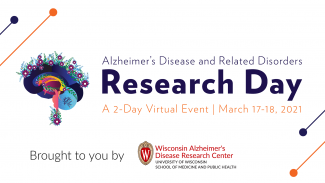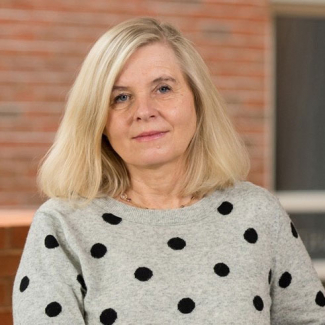
The Wisconsin Alzheimer’s Disease Research Center (ADRC) will host the annual Alzheimer’s Disease and Related Disorders Research Day March 17-18, 2021. The event brings together faculty, students and researchers from a wide range of disciplines to share scientific findings and build industry connections related to the dementia research field. This year’s event will offer networking opportunities beyond the UW-Madison campus with its new virtual format, as well as a new research mentoring panel series designed to give trainees a deeper understanding of Alzheimer’s disease research careers and pathways.
“Through this virtual experience, Alzheimer’s disease and dementia experts will share their most exciting findings from across the field of AD research,” said Barbara Bendlin, PhD, leader of the Research and Education Component (REC) of the Wisconsin ADRC.
The theme of this year’s event, “From pathology to patient care,” underscores the mission to bring together experts from nearly every aspect of dementia research to share their knowledge. With a two-day virtual setting, event-goers can choose which parts they are most interested in attending.

Day 1 is open to the public and will kick off with the keynote presentation, “Brain Fluid Transport — A Role in Neurodegeneration?” from Maiken Nedergaard, MD, DMSc, professor of neurosurgery, neurology and neuroscience and co-director of the Center for Translational Neuromedicine and Division of Glial Disease and Therapeutics at the University of Rochester Medical Center, as well as professor of glial cell biology and co-director of the Center for Translational Neuromedicine at the University of Copenhagen.
Dr. Nedergaard is a pioneer in the field of neuroglial signaling and is noted for discovering the (glia-lymphatic) glymphatic system, a brain-wide fluid clearance system.
Day 1 will also feature presentations from Wisconsin researchers Mariana Pehar, PhD, Lindsay Clark, PhD, and Tobey Betthauser, PhD. At 3:00 p.m. the interactive poster session will allow presenters to interact with judges and visitors virtually through Zoom.
Day 2 will focus on career and science development with four panel sessions covering leading ADRD topics: Basic Science, Community-Based Outreach, Neuroimaging, and Clinical and Biomarker Research. Core Leaders from the Wisconsin ADRC will moderate the panel discussions with experts in the field. During this unique networking opportunity, attendees will learn about the experts' paths to research and their current work. Trainees are invited to interact with our panelists, and two or three trainees per panel will also have the unique opportunity to participate as co-moderators. Trainee co-moderators are pre-selected through a nomination process or self-nomination process in the event registration survey.
“Through these interactive panel sessions, we hope to inspire the next generation of Alzheimer’s disease and dementia researchers by sharing the exciting work of these experts and the path that led them into a research career,” Dr. Bendlin said.
Follow us on Twitter using #WiADRD21.
Click here for the full two-day agenda and to register for the event.
- Log in to post comments



